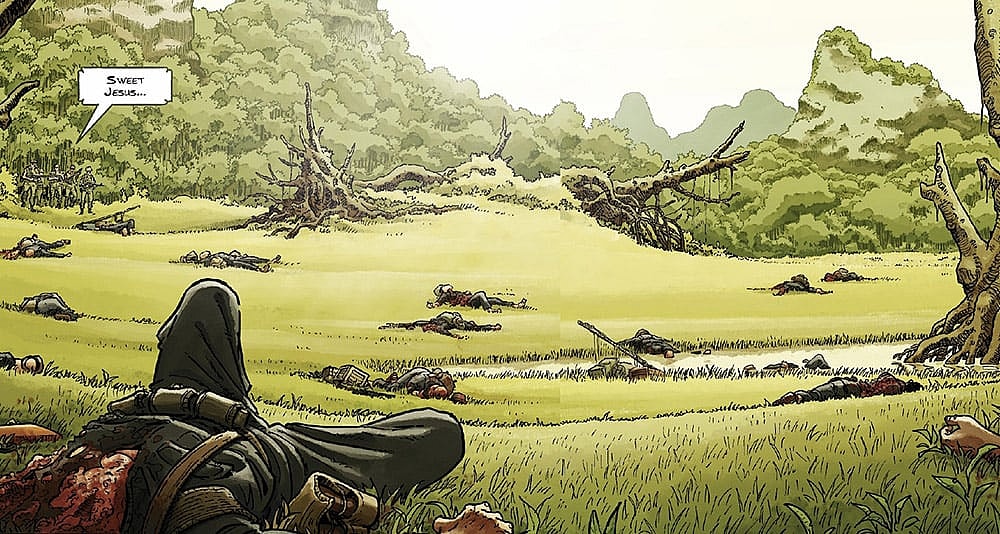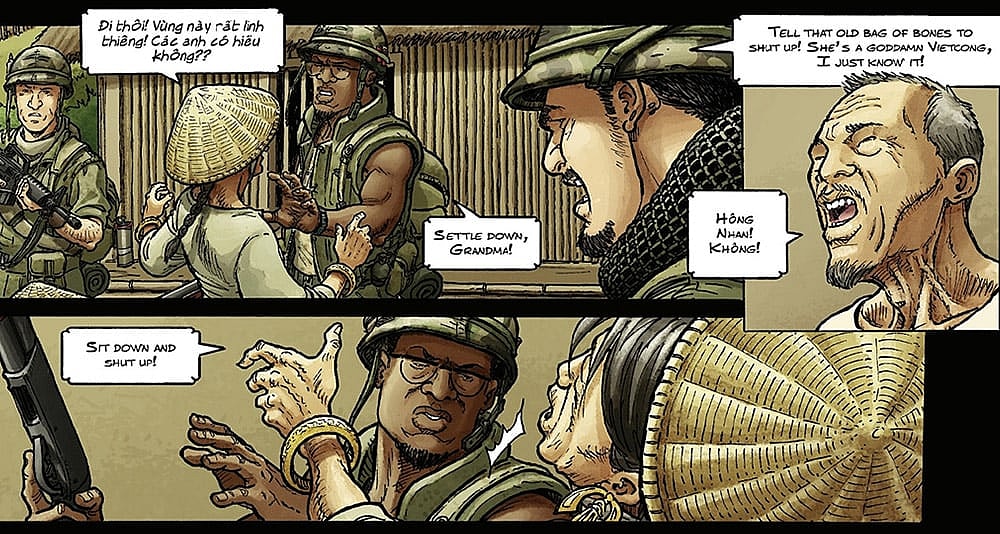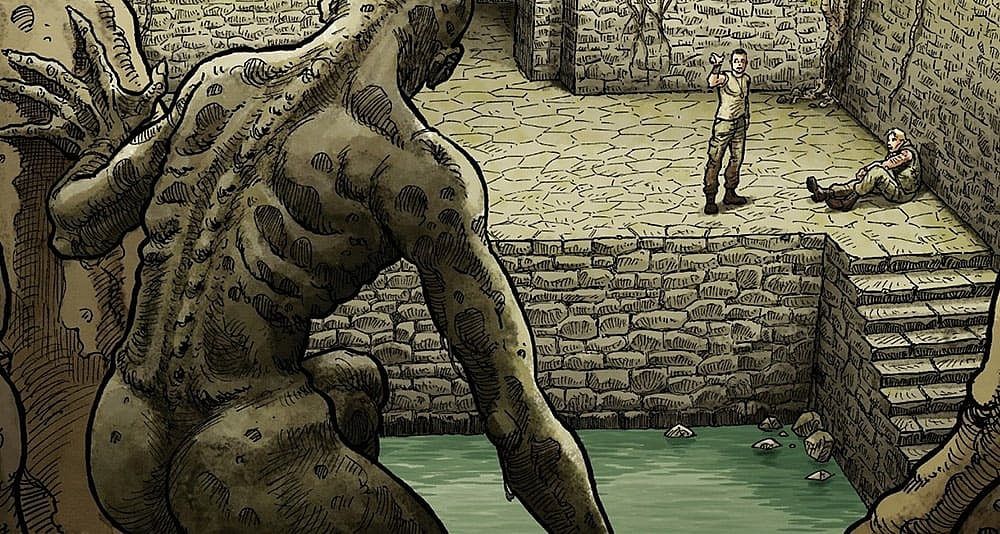Comic Book Reviews•Comic Books
‘Latah’ Review – A Derivative, Yet Intriguing Vietnam-Era Horror Comic Book

Creative minds have been milking the Vietnam War for all it is worth over the decades, thanks largely to how brutal and nightmarish the conflict actually was. Without the Vietnam War, the likes of John Rambo would never have been born, nor would many of the 1980s action movies that defined an entire era. Comic books have mined this particular vein as well, and one of the latest is Latah, courtesy of Europe Comics.

RELATED: 10 Most Outrageously Awesome 80s Action Movie Quotes
Latah is a highly interesting read, with solid characters who interact with one another in a realistic and human manner. There are no superheroes to speak of here, only a team of embattled and grizzled soldiers mucking about in the jungles, while falling victim to the horrors within. However, things take a turn for the worst when it becomes clear that a supernatural entity is stalking them.
This is part of what makes Latah such a great read, even if the premise is too derivative to be called original. The story is a familiar combination of the internecine conflict and mental breakdown touched on in films like Platoon and Full Metal Jacket, with sprinklings of Predator thrown in to round out the story. However, Latah is surprisingly light on sci-fi and fantasy elements, and heavier on the psychological underpinnings of its main characters.
THE STORY
Latah begins on a purposely ambiguous note, with several pages devoid of dialogue which rely on the excellent and detailed artwork to provide exposition. The reader is not meant to understand the crux of the plot until the final few pages, and while this tactic also feels a bit clichéd, it nevertheless works here.

The story revolves around a group of soldiers busily trekking through the Vietnam jungles to mark key targets for napalm drops. Within the first act, it becomes clear that the men are suffering from post-traumatic stress disorder, and tensions are building. Things take a turn when they are intercepted by an Associated Press journalist named Huyn Than My, who accompanies the team under the pretense that he is covering them for an upcoming article.
However, Huyn Than My knows more than he’s letting on, and when the group discover an open field littered with grisly dismembered corpses, he educates them about the ancient stories from his culture that speak of the “Latah,” a creature of folklore bred from centuries of countless wars and bloody conflicts. At first, it feels like the aforementioned Predator ripoff, but there are stark differences.

At its heart, Latah is largely a story about psychological trauma, intense guilt, and karma. The nature of its titular creature is fully explained as the story moves along, but the reader soon discovers that the real monsters are, in fact, the soldiers themselves, who have a lot to answer for. It’s that final act of the story that truly seals the deal, and gives full justification for the horrific events taking place.
THE GOOD
First and foremost, Latah’s art style is dazzling. There’s a wealth of detail in every panel, and the use of earthy and green tones is appropriate for the Vietnam jungle setting, while also giving the comic a vintage feel. There’s a deeply cinematic quality to the way the shots are constructed, and represented in each of the panels. In many ways, it feels more like a storyboard for a Hollywood film adaptation.

RELATED: ‘Predator’ Series Producer John Davis Praises Director Dan Trachtenberg For His Work On ‘Prey’
And perhaps that’s the best case to make for Latah. The visuals are splendid, but the story itself is also independent enough to stand on its own as a full-length psychological horror film. However, in order to achieve that level of success, the story would need to be fleshed out far more than what’s on these pages, with more action and subplots to liven things up.
In the context of a comic book, however, Latah is a winner. It doesn’t reinvent the wheel in any way, but it does steal (wholesale) the best elements of the films mentioned in the introduction of this review, while still broadening the scope of the narrative enough to feel interesting in its own right. I admit that my own expectations were pleasantly circumvented when I finally learned out just what the Latah really was, and that’s the big payoff.

The writing is also particularly good, and no punches are pulled. Latah refuses to whitewash the ugliness of the Vietnam conflict, or the symptoms of the time period it took place in. Racism is prevalent in the story, and it goes every which way, which is a refreshing change of pace from the Woke Left’s “only white people can be racist” false narrative. These soldiers may be brothers-in-arms, but there’s little love lost between several of them.
It’s a mature story, complete with rough language and a deep-seated understanding of all the horrors laid to bare during the Vietnam War. For that, it deserves praise, whatever your particular feelings are about the nature or justification of the war in general.
THE BAD
Latah’s greatest strengths are also its weaknesses. Spotting the tropes and clichés from Vietnam dramas and jungle warfare action flicks is about as easy as seeing your own fingers before your very eyes, and that’s a problem. It takes a remarkable amount of good will to overlook the stolen elements, and see Latah for what it is. If you manage it, there’s a great – though not fantastic – story to be had here.

The second problem is Latah’s overall length, which is rather short. Sure, this may be a self-contained one-shot story, but it didn’t have to be. In fact, Latah could have benefitted from a multi-issue release schedule where more time was given to the subtleties of the story. For instance, character development is on a short leash here, and there’s no real backstory to any of them.
It would have been nice to see flashbacks of each individual soldier, and their respective personalities before they were drafted for wartime service. This would have better served the narrative, particularly the predominant theme of psychological guilt and the devil getting his due. It’s obvious that some characters were always terrible, while others were permanently scarred by the horrors they witnessed in the sweltering Vietnam jungle.

And finally, the Latah itself, which represents an interesting twist on the slasher villain motif, isn’t nearly as dynamic or terrifying as it should be. At best, it’s more of a template representing the worst of humanity’s darker traits, but it should have had more presence. However, the physicality of the creature isn’t what counts, but rather, what it represents at large.
CONCLUSION
If nothing else, Latah is a great pitch for an authentic, gritty, and fully fleshed out Vietnam horror film. There aren’t many of those kicking around, which is why it deserves a second look. For comic book readers, this story won’t revolutionize the industry, but it is a nice departure from the mediocrity permeating the field thus far.

Europe Comics and writer Thomas Legrain deserve a lot of praise for Latah, even if it’s something of a mixed bag. Hopefully, Legrain will take the lessons learned here and refine his style for future projects, because there’s a lot of good just waiting to be tapped. For now, Latah is a well thought out alternative to mainstream comics and anime. It isn’t preachy or Woke, and any political statements it does make are quickly drowned out by the insular and introspective narrative surrounding its guilt-ridden main characters.
NEXT: Marvel And DC Writer Shannon Hale On Utah: “It’s Just Too White”
